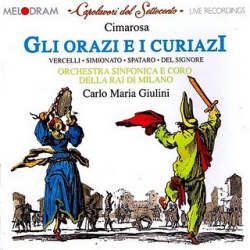Domenico Cimarosa - Gli Orazi e i Curiazi (1990)
Domenico Cimarosa - Gli Orazi e i Curiazi (1990)

CD1 1. Gli Orazii Ed I Curiazi, opera: Ouverture 2. Gli Orazii Ed I Curiazi, opera: Act 1. Odi o ciel i nostri lai 3. Gli Orazii Ed I Curiazi, opera: Act 1. L'alto genio di Roma nascente 4. Gli Orazii Ed I Curiazi, opera: Act 1. Germe d'illustri eroi 5. Gli Orazii Ed I Curiazi, opera: Act 1. Oh dolce, e caro istante 6. Gli Orazii Ed I Curiazi, opera: Act 1. Quelle pupille tenere che brillano d'amore 7. Gli Orazii Ed I Curiazi, opera: Act 1. Se alla patria ognor donai 8. Gli Orazii Ed I Curiazi, opera: Act 1. Scopransi i vaghi rai play 9. Gli Orazii Ed I Curiazi, opera: Act 1. Ti giura il labbro e il core 10. Gli Orazii Ed I Curiazi, opera: Act 1. Nacqui è ver fra grandi eroi 11. Gli Orazii Ed I Curiazi, opera: Act 1. Quando nel campo, armato d'acciar CD2 1. Gli Orazii Ed I Curiazi, opera: Act 2. Lasciami per pietà 2. Gli Orazii Ed I Curiazi, opera: Act 2. Combatteremo, trionferemo 3. Gli Orazii Ed I Curiazi, opera: Act 2. Se pietà nel cor serbate 4. Gli Orazii Ed I Curiazi, opera: Act 2. Qual densa notte! 5. Gli Orazii Ed I Curiazi, opera: Act 2. Ei stesso intrepido fra queste tenebre play 6. Gli Orazii Ed I Curiazi, opera: Act 2. A versar l'amato sangue 7. Gli Orazii Ed I Curiazi, opera: Act 2. Giusti Dei! Della pugna ecco il segnal! 8. Gli Orazii Ed I Curiazi, opera: Act 2. Vinsi, Romani; palpitante in petto Orazia - Angela Vercelli Curiazio - Giulietta Simionato Marco - Tomaso Spataro Publio - Gino Del Signore Sabina - Renata Broilo Licinio - Walter Artioli Sacerdote - Dario Caselli Augure - Leonard Wolovsky Orchestra Sinfonica e Coro della RAI di Milano Carlo Maria Giulini, 13.04.1952
Gli Orazi e i Curiazi is an opera in three acts (azione tragica) composed by Domenico Cimarosa to a libretto by Antonio Simeone Sografi, based on Pierre Corneille's tragedy, Horace.
The opera was first staged on 26 December 1796 at the Teatro La Fenice in Venice, Italy . The première was so unsuccessful that Cimarosa, disappointed, decided to leave the town immediately. The run of the following performances turned into a big success, as would happen twenty years later with Rossini’s The Barber of Seville, and the second was even more successful. At least 49 performances were held throughout the season and the opera was later staged in the major European theatres — including Teatro La Scala in Milan and Napoleon’s imperial court in Paris In Europe during the 18th century Italian operas did not normally endure very long in theatres, hardly ever getting through one season. Gli Orazi e i Curiazi, however, kept running for several decades, even after the death of Cimarosa. In Venice, for example, the opera had four further runs during the six years following the première and "more than 130 performances" altogether were staged in the same period.
Synopsis
The action takes place in Rome during the war against the town of Alba Longa. The protagonists of the opera are two families, the Horatii from Rome and the Curiatii from Alba. In spite of the state of war the two families are connected as a girl from the Curiatii, Sabina, has married Marcus Horatius, the designate heir of the Roman family. During a truce in the war Horatius' daughter Horatia is in her turn given in marriage to her beloved Curiatius, leader of the Alban family. In order to avoid further major damage the two kings, Tullus Hostilius and Mettius Fufetius, reach an agreement to settle contention between the two towns through a limited encounter to the death between six champions, three from the Horatii and three from the Curiatii. The news of the agreement drives the two families to despair as the two sisters-in-law are doomed to weep over the death of either their husbands or their brothers.
In act two Horatia and Sabina, supported by the people and the priests, endeavour to prevent the abomination of a mortal challenge between relatives by swarming over the Campo Martio just as the struggle is about to start. They manage to wring a postponement in order to allow Apollo’s oracle to be consulted. Both families warriors accept this decision reluctantly. Act two ends in a grand scene in the vaults of Apollo’s temple: at first Curiatius and Horatia appear there alone, later they are joined by all the others and Curatius bewails the sad fate of those who are possibly going to shed their relatives' blood. Finally the oracle’s voice proclaims that the challenge must go on.
Act three is shorter than the others and is generally staged along with the act two. After a farewell scene between Curiatius and Horatia it shows the final encounter between Marcus Horatius, victorious in the fight, and his distressed sister. Horatia, rebelling against her fate, calls down curses from the gods upon her native town which has driven her husband to a bloody death and is in her turn slain by her furious ruthless brother and flung headlong down the staircase.
download: uploaded anonfiles yandex 4shared solidfiles mediafire mega filecloud
Last Updated (Tuesday, 08 October 2013 22:58)








